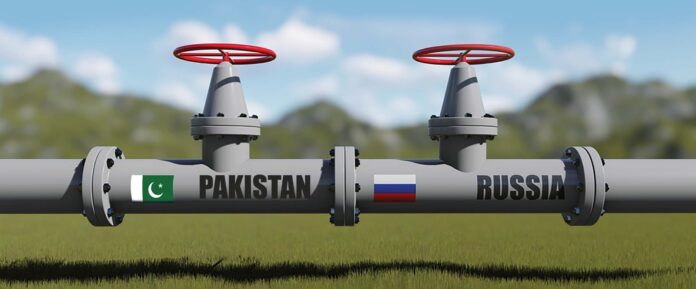Staff Report
ISLAMABAD: Minister Petroleum Musadik Malik on Wednesday rejected reports of oil import agreement with Russia. No agreement has been reached regarding the purchase of crude oil from Russia, Musadik Malik said during his informal media talk. He said the deregulation of the fuel prices would benefit the masses and added that the final decision about the deregulating the fuel prices would be taken by PM Shehabz Sharif.
Media reports suggested that during the Inter-Governmental Commission (IGC) meeting being held in Moscow, both countries had agreed to restart the crude oil trade from January 2025 and that Pakistan would import one cargo each month under the government-to-government arrangement.
However, elaborating on the issue, the petroleum minister said that the government wasn’t buying any crude oil cargo from Russia. “We are creating such a framework that the consumer gets cheap oil.” Pakistan signed a deal with Russia in 2023 to import crude oil that it would then refine locally.
The agreement included a 100,000 metric ton shipment to state-owned Pakistan Refinery Limited (PKRF.PSX), opens new tab. Under that arrangement, Pakistan paid for the crude at a discounted rate using Chinese yuan.
Meanwhile, Oil prices extended gains on Tuesday after the EU agreed to slash oil imports from Russia, fuelling worries of a tighter market already strained for supply amid rising demand ahead of peak U.S. and European summer driving season.
Brent crude futures for July, which expires on Tuesday, gained 33 cents to $122 a barrel at 0054 GMT. The more active August contract rose 33 cents to $117.93.
U.S. West Texas Intermediate (WTI) crude futures were trading at $117.31 a barrel, up $2.24 from Friday’s close. There was no settlement on Monday due to a U.S. public holiday.
European Union leaders agreed in principle to cut 90% of oil imports from Russia by the end of 2022, resolving a deadlock with Hungary over the bloc’s toughest sanction yet on Moscow since the invasion of Ukraine three months ago.
However, some experts said oil price gains may be muted as the market had already priced in the supply constraints. Almost every EU member was on board with the ban, suggesting the market was “already pricing in EU self-sanction and significantly less Russian oil flowing to Europe this year”, SPI Asset Management Managing Partner Stephen Innes told Reuters.
“I think the market is pricing in some more Asia demand via China; however, the glaring concerns are the skyrocketing petrol prices at the pump that could lead to some driving season demand destruction,” Innes added.
Demand from China is expected to pick up after the easing of COVID-19 curbs. Shanghai has announced an end to its two-month-long lockdown, and will allow the vast majority of people in China’s largest city to leave their homes and drive their cars from Wednesday.
On the production side, OPEC+ is set to stick to last year’s deal at its meeting on Thursday, with a modest July output hike by 432,000 barrels per day, six OPEC+ sources said, rebuffing Western calls for a faster increase to lower surging prices.
Members from the group – the Organization of the Petroleum Exporting Countries and allies led by Russia – maintain that the oil market is balanced and that the recent price hikes are not related to fundamentals.
Oil prices on both sides of the Atlantic have soared to their highest in over a decade in 2022 and are up more that 55% so far this year.





